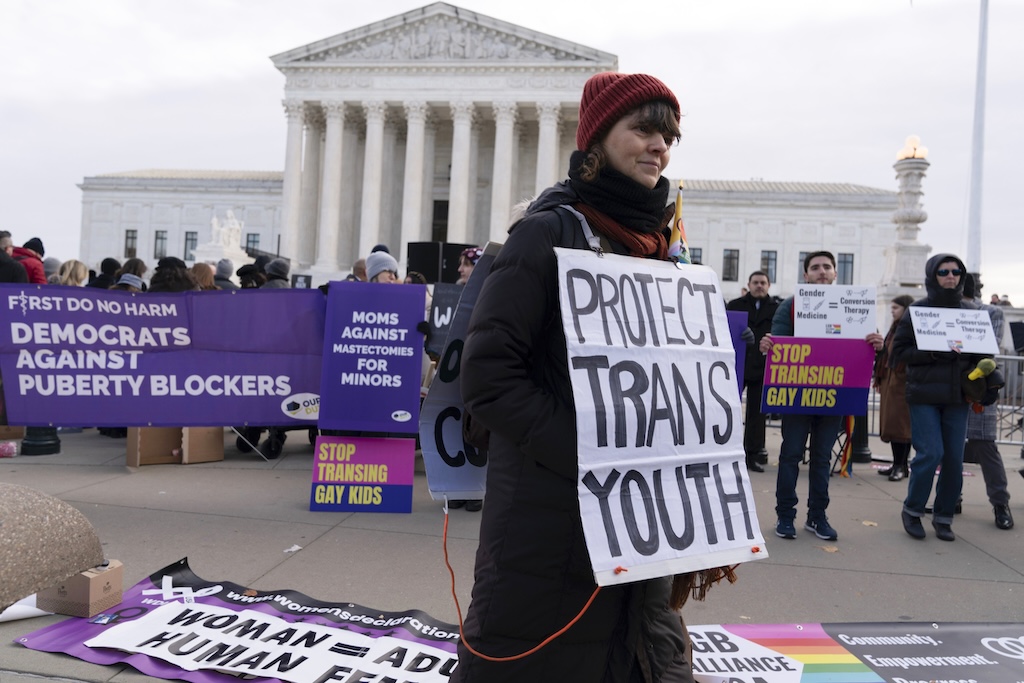


The American Civil Liberties Union asked the Supreme Court this week to dismiss a case the justices are scheduled to hear in their upcoming term about a transgender sports law, a move opponents claim is an effort to take the issue away from the high court to avoid another bruising loss for the transgender cause.
The ACLU, in a filing on the Supreme Court’s docket, stated Lindsay Hecox, the biological male who sued Idaho over a law restricting women’s sports to biological women, had filed for the claims to be dismissed in the federal district court with prejudice and that Hecox has “no live claim” against the state.
Recommended Stories
- Appeals court's FTC reinstatement sets up likely Supreme Court clash over Humphrey's Executor
- Trump will appeal $5 million E. Jean Carroll ruling to Supreme Court
- Amy Coney Barrett's new book will discuss her vote to repeal Roe v. Wade
“Hecox’s unequivocal abandonment of [the] claims against petitioners renders this case moot, and since the dismissal is with prejudice, there is no possibility of the regeneration of the controversy by a reassertion of a right to litigate,” the filing claimed.
“Because the issues presented are no longer live and because no controversy between the parties exists or has a chance of recurring, this case should be dismissed as moot,” the filing continued.
The ACLU, which has represented Hecox during the legal battle that began in 2020, claims Hecox, now a senior at Boise State University, has “firmly committed not to try out for or participate in any school-sponsored women’s sports covered by” the disputed law and claims the “negative public scrutiny from certain quarters because of this litigation” has distracted Hecox from schoolwork.
The Alliance Defending Freedom, a conservative law firm that assisted Idaho in petitioning the high court to take the case, slammed the filing Thursday, claiming the ACLU was retreating on the case because the Supreme Court wants to hear it.
“The Constitution and Title IX allow states to protect women and girls by reserving women’s sports for women. Americans overwhelmingly agree that men should not compete in women’s sports. Now, after the ACLU has litigated this case for over five years and repeatedly stressed that this case is a ‘live controversy,’ ‘an actual ongoing controversy,’ and ‘not moot,’ the ACLU is suddenly saying the case is moot and no longer a live controversy. What changed? The Supreme Court agreed to hear the case,” ADF Senior Counsel John Bursch said in a statement.
“Fortunately, the U.S. Supreme Court has declared that it views ‘with a critical eye’ such post-grant ‘maneuvers designed to insulate a decision from review by this Court.’ We will urge the Supreme Court to rule in this case and ensure that Title IX stands as it was originally intended: to protect fair competition and equal opportunities for women and girls,” Bursch added.
Bursch noted that in 2021, the ACLU successfully fended off a claim of mootness in the case made by the state after Hecox had unenrolled from the university in the middle of litigation while stating an intention to reenroll and attempt to play sports again. The ADF senior counsel also pointed to Justice Samuel Alito’s 2012 majority opinion in Knox v. Service Employees, which denied that the legal claims in the case at issue were moot despite the union at the center of the case refunding disputed payments after the high court took up the dispute.
“After certiorari was granted, however, the union sent out a notice offering a full refund to all class members, and the union then promptly moved for dismissal of the case on the ground of mootness. Such post-certiorari maneuvers designed to insulate a decision from review by this Court must be viewed with a critical eye,” Alito wrote.
“The voluntary cessation of challenged conduct does not ordinarily render a case moot because a dismissal for mootness would permit a resumption of the challenged conduct as soon as the case is dismissed,” he added.
Iowa Solicitor General Eric Wessan called the move a “procedural hail mary” and argued there should be severe restrictions on the attorneys from bringing a similar case if the case is deemed moot in order to avoid the appearance “gamesmanship.”
“Procedural Hail Mary thrown by the ACLU and [Cooley LLP] in this culture war case. After arguing for five years the case must continue (and winning) they now try to take their ball and go home to stop Supreme Court review. Certainly not the Normal Appellate Process!” Wessan wrote in a post on X.
“If this is successful, there should be some bar not only on the Plaintiff from refiling, but on the attorneys bringing a new facial challenge against the law. Else this type of dismissal could be seen as gamesmanship!” he added.
The case, Little v. Hecox, which the ACLU is claiming is now moot, is one of two cases the Supreme Court is scheduled to hear in its upcoming term that involve laws limiting women’s sports to biological women. The Hecox case deals with the question of whether the law and others like it violate the 14th Amendment.
APPEALS COURT’S FTC REINSTATEMENT SETS UP LIKELY SUPREME COURT CLASH OVER HUMPHREY’S EXECUTOR
The Supreme Court will also hear B.P.J. v. West Virginia State Board of Education, which deals with a similar West Virginia law, as well as whether the restrictions violate Title IX or the Equal Protection Clause.
Barring the Supreme Court finding the Hecox case moot, both cases are expected to have oral arguments before the justices in the coming months, with a decision expected by the end of June 2026.
